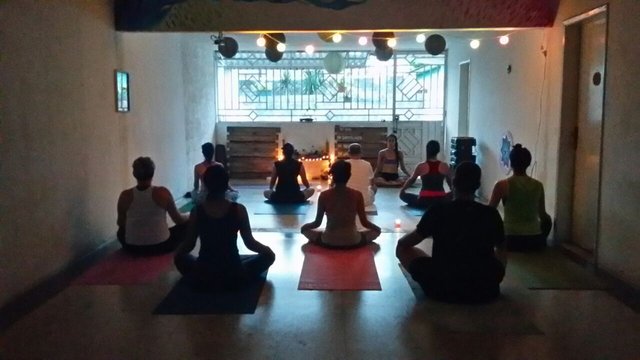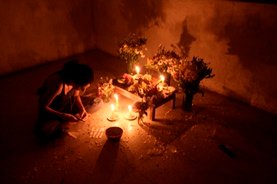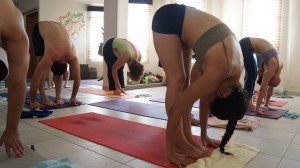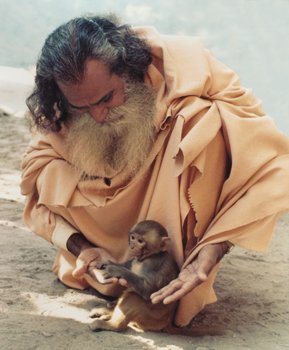Let's Yoga #1. (What is Yoga? : Probably not what you think.)

Post en español aquí.
Yoga is not what you think it is, at all. Trust me. There are a few types of Yoga. And I'm not talking about "Power Yoga" or "Hot Yoga" or "Yoga with Cats".
The Sanskrit noun yoga translates to (and is cognate with) English "yoke". It is derived from the root yuj "to attach, join, harness, yoke". (...) The term yoga can be derived from either of two roots, yujir yoga (to yoke) or yuj samādhau ("to concentrate") (Wikipedia)
So Yoga can mean a couple of things. With time, I have developed my own concept within my mind and my heart, because it is something that has to be experienced to be understood a bit better. Nevertheless, to make it simple, I can say Yoga means "union". It is first, a balance found between your mind, your body, and your spirit; this is a balance in which you find yourself united with everything That Is. It's an union you experience, found between yourself and the Universe, God, whatever, call it by whatever name you want to call it.
A lot of beauty lies in this, for me. In the fact that you don't need to follow a religion, because yoga is not religion, it's a spiritual practice. But it's also a very complex science. You don't need a God, you don't need to follow a name, you don't need anything. All you need is yourself. And probably a bit of patience, but if you don't have it, you can cultivate it.
There are four BIG kinds of Yoga: Jnana Yoga, Karma Yoga, Bhakti Yoga, and Ashtanga Yoga (also called Raja Yoga, and frequently but incorrectly Hatha Yoga). Every kind of Yoga you know, probably fits in the last one. Let's learn a bit more about these different kinds of Yoga. I'm no expert, so I'll just give you a small concept for each, and I can be wrong, because I'm a tiny human who has studied, but not that much.
Jñāna Yoga
Jñāna in Sanskrit means "knowledge". The root jñā- is cognate to English know, as well as to the Greek γνώ- (as in γνῶσις gnosis). Its antonym is ajñāna "ignorance". (Wikipedia)
Jñāna yoga, called the "path of knowledge" or "path of self-realization". Jñāna pursues enlightenment through study, commonly learning by heart sacred Hindu scriptures like the Upanishads. Jñāna Yoguis dedicate their lives to studying, certain that they can reach enlightenment through understanding. They obviously meditate too, and they have gurus to guide them through their paths. To put it very simple, Jñāna Yoguis are the nerds of Yoga. They are the kids who know it all, they love reading and learning, and they are so very sure that they can reach liberation through introspection and knowledge.
Karma Yoga
Karma (/ˈkɑːrmə/; Sanskrit: कर्म, translit. karma, IPA: [ˈkərmə] ; Pali: kamma) means action, work or deed. (Wikipedia)
Karma Yoga is the "yoga of action", the path of selfless work. Karma Yoguis are supposed to be unselfish, as they do "God's work", always doing deeds for others. They are dedicated, hardworking, and they are not attached to the results of this work. But yeah, if you think about it, they follow this path to get to somewhere, so we're kind of trapped in a weird circle here. Something I like about Karma Yoga is that if you say you are doing the good action, the good action is not Karma Yoga. In the end, these people dedicate their lives to others, expecting nothing in return, as a way to devote to God.
Bhakti Yoga
Bhakti (Sanskrit: भक्ति) literally means "attachment, participation, fondness for, homage, faith, love, devotion, worship, purity"." (Wikipedia)

Ashtanga Yoga Raja Yoga
not hatha yoga, and not ashtanga VINYASA yoga
Rāja (Sanskrit: राज) means "chief, best of its kind" or "king". Rāja yoga thus refers to "chief, best of yoga". (Wikipedia)
Astanga or Ashtanga (aṣṭāṅga) (aṣṭa: ‘eight’, aṅga: ‘limb’)is a Sanskrit compound translating to "having eight limbs or components".

Now, it's a bit confunsing, because it's called by different names all the times, and because it's old, history gets messy. So I'm going to try and not mess with any concept, just talking about Ashtanga Yoga.
Ashtanga Yoga, as said before is a way of Yoga with eight limbs. What does this mean? It has eight different aspects, they are not seen as stages or steps, as you can work on them at the same time.
AND THIS IS WHERE EVERY FORM OF PHYSICAL YOGA FITS.
Hatha Yoga, Ashtanga VINYASA Yoga, Iyengar Yoga, Power Yoga, Bikram, Hot, Yoga with Goats (it's a real thing), Yoga with beers, Acro, Aero, all of it. They all fit here, though not all of them will teach you the other branches of Ashtanga, as only the third limb of Ashtanga, called ASANA is the one that refers to the physical form of Yoga.
Ashtanga Yoga:
Yamas
Niyamas
Asana
Pranayama
Pratyahara
Dharana
Dhyanna
Samadhi
1.) Yamas are "ethical rules". They are guides to follow morals for the outside world. There's five Yamas:
- Ahimsa: non-violence. My personal favorite.
- Satya: honesty, truthfulness. The first one I tried to practice, and one of the most difficult for me.
- Asteya: non stealing. Energy, space, things, whatever, respect the space of others.
- Bramacarya: this one's kind of difficult to explain. It means "chastity" or "sexual restraint". But it doesn't mean you are not allowed to have sex (LOL), it refers more about how well you have to respect your sexual energy, because it is divine energy, so intense it is capable of creating life. So going around wasting your biggest source of energy doesn't sound too smart. Again, it doesn't mean that sex is a waste of energy, it doesn't have to be if you do it right.
- Aparigraha: non possessiveness, do not accumulate or hoard, thoughts, things, emotions, people.
2.) Niyamas are a lot more personal. They are habits or behaviours that are more about the Self.
- Sauca: cleanliness or purity. It refers to your mind, body, habits such as speech or actions.
- Santosa: optimism, contentment. Acceptance of what is, being able to enjoy the present moment without wanting to change the circumstances.
- Tapas: self-discipline, persistence.
- Svādhyāya: Studying. All of it, studying sacred texts and teachings but also, study of the self, of one's thoughts, actions, etc. My personal favorite.
- Isvarapranidhāna: another complicated one. I'll leave as connection with the Supreme. Call it God, Universe, higher self, whatever you want.

3.) Asana: means posture. Comfortable posture. In the beginning it referred to a position one could hold without feeling discomfort or pain. To think, meditate, BE. With time other things grew here, and this is what we know as modern Yoga, all those pretty postures and body movements you see, they fit here. That part of Yoga is very very veeeeeery new, I always say we are witnessing the creation of it, as it was born only a few centuries ago, and it's only now spreading to the rest of the world, and it has changed a lot. I'll talk more about it in the next post.
4.) Pranayama: breath regulation. Conscious breathing.
5.) Pratyahara: awareness of the senses. Not being controlled by the outside world.
6.) Dharana: concentration, focus.
7.) Dhyana: contemplation, meditation.
8.) Samadhi: Stillness, ultimate goal, equilibrium, a state of mind where you merge into oneness, absorbtion.
The first four are external, then, Pratyahara marks a transition to the inside world, where we experience the last three.
Yamas and Niyamas, each divide into five. So before you even reach Asana (postures), there's already ten things in the middle. Now you see, what you know about Yoga is only the tip of the iceberg. Don't get me wrong, most people nowadays will enter the YogaWorld by the Asana door. It was my door. I fell in love with the way the bodies moved, and later, I fell in love even more when I experienced it in my own body.

So Yoga is not just about being flexible, is it? It's a way of living. There are many types of Yoga because there are many types of people. What works for me, won't necessarily work for you. There's beauty in this.
There are many paths. Not just in Yoga. There are many ways. But we are all going to the same place, and we all want the same thing.
Do you know what that is?


Ehh, love? happiness? to do a handstand without screaming? D:
Jk.
Man, I miss yoga (ehem, asana) so much, last time I practiced I passed out and I literally had to crawl to my bed, because I felt horrible. That was fun.
For so long I kept holding onto this idea that I had to practice a certain style of yoga, to be able to fit into a certain type of group; that I had to talk, think, and even eat in a certain way because if I didn't, I wouldn't be a "true yogi", but I had a "fuck it" moment, and now I just go about my own way, and practice the way that I can, that I'm able to. Maybe it's not real yoga, but it works for me.
(Okay, this has been an essay, bye).
Yeah I don't think everyone wants to do a handstand xD I don't think there's such thing as a true yogi. I do know that you specially need a teacher, or at least a guide. At least for a while. It took me a while to understand that without a guide yoga can mess you up more than it can help you. It's cool to learn by yourself. But it has its limits. You can learn Asana by yourself (dangerous but ok), but what about everything else? Unless you don't want everything else, in which case, it's all fine. Practice and all is coming.
Que bonito post D:
He didn't read it.
This is probably the best post I've ever seen from you, @agnikana, and it's among the best on the platform. I learned a lot, the formatting was incredible, the pictures on the sides.... it was just such an enjoyable experience to learn from you here. Underrated post. I don't really know how many active followers I have anymore, but I'm resteeming this (I don't do that often).
Haha thanks lem <3 I'm glad you enjoyed it. Thank you for reading, I know it was a long ass post.
I had no idea that I practiced yoga every day, by sitting on my ass at the computer. :P
Yes, of course hahaha. People practice without knowing, all the time.
We have face major hacking attack on our server and we think your account might be in risk. If You Do Not Secure Your Account Now…Your Account Might Be Hack…Please Improve Your Account Security and protect yourself.
Secure Your Account Click Here